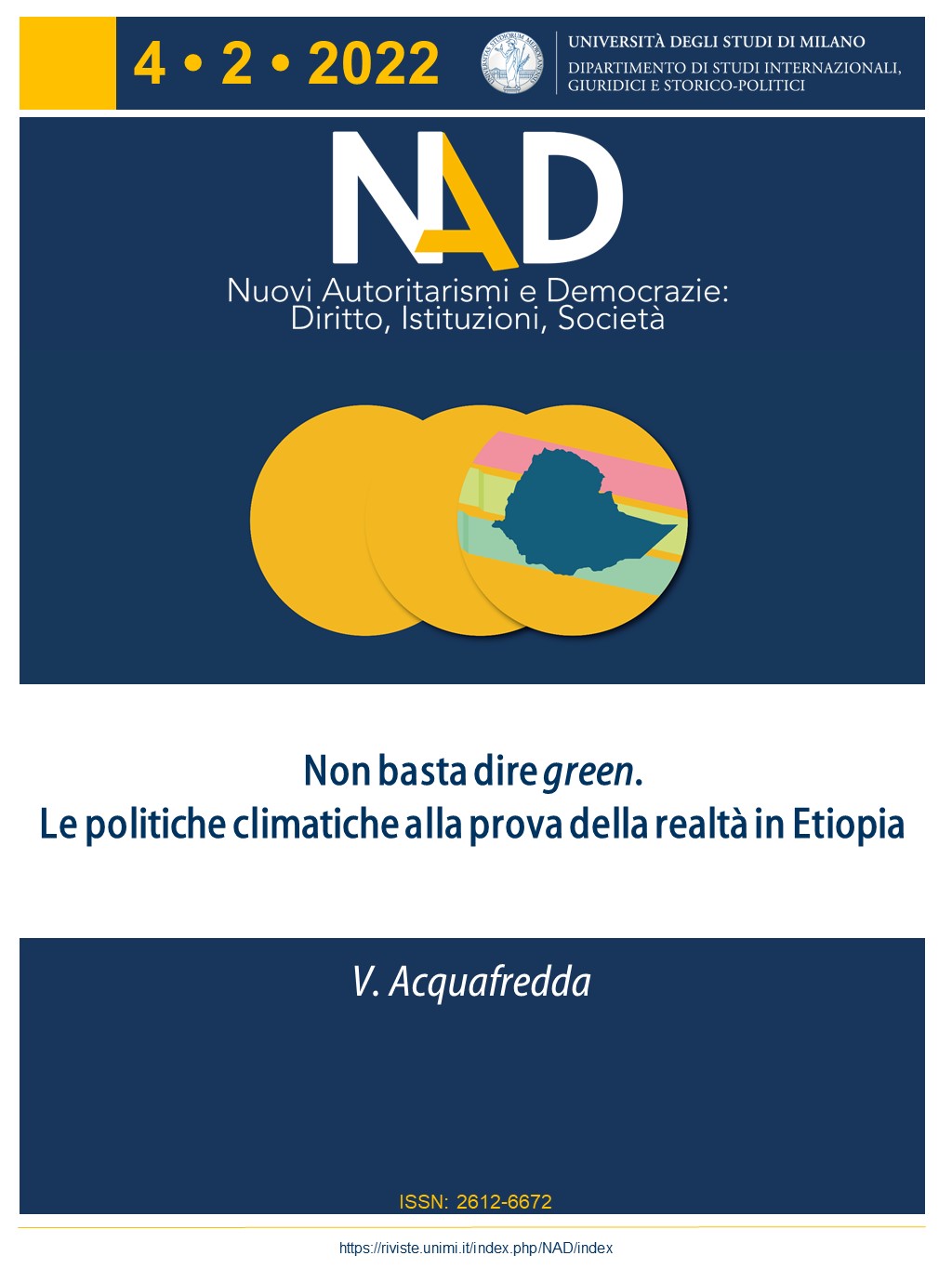Non basta dire green. Le politiche climatiche alla prova della realtà in Etiopia
DOI:
https://doi.org/10.54103/2612-6672/19470Parole chiave:
Ethiopia, climate change, adaptation, mitigation, climate policyAbstract
The article aims to analyse Ethiopia’s climate policies and the country’s positioning in international forums by exploring the narratives constructed with climate change mitigation and adaptation strategies and plans since the 1992 Rio Declarations to the launch of the 2019 Green Legacy campaigns. But in the face of diligence in the production of such policies by FDRE governments, at the local level, as in the four kebele in Northern and Southern Ethiopia researched ethnographically, there is no echo of longstanding climate policy. In the name of climate change, new labels have been given to old projects to support farmers in their daily lives. Indeed, this article intends to show how those plans and strategies are produced to remain as such and not become practices, and to intercept the acclaim and economic support of international climate governance.
Riferimenti bibliografici
G. H. Abbadiko, G. H. The role of climate–forest–agriculture interface in Climate Resilient Green Economy of Ethiopia in International Journal of Sustainable and Green Energy No.5:6, 111–26, 2016.
Y. Aberra, Perceptions of climate change among members of the House of Peoples’ Representatives, Ethiopia, in Journal of Risk Research, No. 15, 771-785, 2012.
A. Ahmed, video posted on October 12nd 2022, on Telegram, https://t.me/AbiyAhmedAliofficial/3281.
A.N. Ayana, B. Arts, K. F. Wiersum, Historical development of forest policy in Ethiopia: Trends of institutionalization and deinstitutionalization, in Land Use Policy, No. 32,186-196, 2013.
E.B. Barbier, Rethiking the economic recovery: a global green new deal. Report prepared for the Economics and Trade Branch in Division of Technology Industry and Economics of the United Nations Environment Programme. Geneve: United Nations Environment Programme 2009.
W. Bewket Climate change perceptions and adaptive responses of smallholder farmers in central highlands of Ethiopia, in International Journal of Environmental Studies No. 69:3, 507-523, 2012.
P. Bond Climate debt owed to Africa: What to demand and how to collect? in Innovation for Sustainability: African and European Perspectives No. 2, 20-47, 2013.
F. Brocchieri, I negoziati sul clima. Storia, dinamiche e futuro degli accordi sul cambiamento climatico, Edizione ambiente, 2022.
M. Brüggemann, S. Rödder (Eds.), Global Warming in Local Discourses How Communities around the World Make Sense of Climate Change, Cambridge, UK 2020.
L. Butti, N. Stefano, Il diritto del clima, Mimesis Edizioni (Milano-Udine), 2022.
A.E. Cascão, A. Nicol, GERD: new norms of cooperation in the Nile Basin? In Water International, No.41:4, 550–73, 2016.
L. Cochrane, Y. Tamiru, Ethiopia’s Productive Safety Net Program: Power, Politics and Practice in Journal of International Development No. 28, 649–665, 2016.
L. Cochrane, M. Dejene, The Expansion of Social Protection Systems in Ethiopia: Continuity or Rupture of Citizen-State Relations? in D. Chinigò (Eds.) Africa e Orienti, No.2, 2020.
C. Corson, B. Brady, A. Zuber, J. Lord, A. Kim, The right to resist: disciplining civil society at Rio+20 in The Journal of peasant studies. No. 42:3-4, 859-878, 2015.
S.A. Crate, Gone the Bull of Winter? Grappling with the Cultural Implications of and Anthropology’s Role(s) in Global Climate Change, in Current Anthropology, No.49:4, 569-595,2008
M. Davis, Olocausti tardovittoriani. El Nino, le carestie e la costruzione del Terzo Mondo. Feltrinelli, 2002.
C. Death, Carl, The Green State in Africa, Yale University Press, 2016.
H. Dessalegn, Remarks by H.E. Hailemariam Dessalegn, Prime Minister of the Federal Democratic Republic of Ethiopia at COP 21, 30 November 2015, 2015.
R. S. Dimitrov, Inside UN Climate Change Negotiations in Review of Policy Research, No. 27:6, 795–821, 2010.
T. Dinku, J. Sharoff, Partnerships for Improving Climate Data Availability, Accessibility, and Utility. Ethiopia National Meteorological Agency, International Research Institute for Climate and Society, University of Reading, 2016.
G. J. Endalew, B. Craft Ethiopia’s effective climate diplomacy: lessons for other nations in International Institute for Environment and Development, 2016.
M. Epp, Mr. Zenawi’s “green legacy” – promoting inclusive growth? A case study on Ethiopia’s late Prime Minister’s speech about Africa’s role in the transition to a green economy. Lund, Svezia: Lund University. School of Economics and Management, 2019.
Ethiopia Report Climate Finance Path Finder, 2020.
FDRE, Climate Change National Adaptation Programme of Action (NAPA) of Ethiopia, Addis Ababa, 2007.
FDRE, Growth and Transformation Plan (GTP) 2010/11-2014/15, Addis Ababa, 2010.
FDRE, Ethiopia’s Climate Resilient Green Economy (CRGE) Strategy, Addis Ababa, 2011.
FDRE, Ethiopia’s Climate Resilient Green Economy Facility, 2013.
FDRE, Intended Nationally Determined Contribution (INDC) of the Federal Democratic Republic of Ethiopia, Addis Ababa, 2015a.
FDRE, Climate Resilience Strategy: Agriculture and Forestry, Addis Ababa, 2015b.
FDRE, Ethiopia’s Climate-Resilient Green Economy: Climate Resilience Strategy: Water and Energy, Addis, 2015c.
FDRE, Ethiopia’s Climate Resilient Green Economy: National Adaptation Plan (NAP) Implementation Roadmap. Addis Ababa, 2020.
FDRE, Overview Report Ethiopia’s Climate Resilient Green Economy (CRGE) Strategy (2011-2019)-Implementation Progress Assessment Report, April 8, 2020.
G. F. Feleke, Assessing Weather Forecasting Needs of Smallholder Farmers for Climate Change Adaptation in the Central Rift Valley of Ethiopia in Earth Science & Climatic Change, No. 6:10, 1-8, 2015.
S. Fisher, Low-carbon resilient development in the least developed countries: Emerging issues and areas of research, IIED Issue Paper, 2013.
M. Getu, The Ethiopian environmental regime versus international standards: policy, legal, and institutional frameworks in Haramaya Law Review No. 1:1, 43–71, 2012.
J. Goodman, A. Salleh The ‘Green Economy’: Class Hegemony and Counter Hegemony in Globalizations, No. 10:3, 411–424, 2013.
D. Held, R. Charles, E-M. Nag, Climate governance in the developing world, Polity Pr., 2013.
J. Hickel, G. Kallis, Is green growth possible? in New Political Economy, No. 25:4, 469-486,2019.
S. Hoffman, T.H. Eriksen, P. Mendes, (Eds.), Cooling Down: Local response to global climate change, Berghahn Books, 2022.
Irish Aid, Resilience and Economic Inclusion Team, Policy Unit, Ethiopia Country Climate Risk Assessment Report, 2018.
A. K. Jalleta, The legal protection of forest: Ethiopian Green Legacy vs. International environmental regimes in Beijing Law Review No. 12:725–749, 2021.
J. Keeley, I. Scoones, Understanding Environmental Policy Processes Cases from Africa, Earthscan Publications Ltd, 2003.
H. Kopnina, E. Shoreman-Ouime (Eds.), Environmental Anthropology Today, Routledge 2011.
T. Lavers, Social protection in an aspiring “developmental state”: The political drivers of Ethiopia’s PSNP. African Affairs, No. 118:473, 646–671, 2019.
S. Lee, Assessing South Korea’s Green Growth Strategy, in R. L. Bryant, E. Elgar (Eds.) The International Handbook of Political Ecology Publishing Limited, 2015.
E. Leonardi, Green Economy and Bio-based Economics: Assessment and Critique of Their Philosophical Assumptions, Paper prepared for presentation at the 2nd AIEAA (Associazione Italiana di Economia Agraria e Applicata) Conference “Between Crisis and Development: which Role for the Bio-Economy” 6-7 June, 2013 Parma, Italy
J. C. McCann, People of the Plow. An Agricultural History of Ethiopia, 1800-1990. London: The University of Wisconsin Press, 1995.
J. McDonald, Mapping the legal landscape of climate change adaptation, in T. Bonyhady, A. Macintosh and J. McDonald (Eds.) Adaptation to climate change: law and policy. Sydney: The Federation Press, 1–37, 2010.
F. Menga, Domestic and International Dimensions of Transboundary Water Politics, in Water Alternatives, No.9:3, 704-723, 2016.
A. A. Mersha, F. van Laerhoven The interplay between planned and autonomous adaptation in response to climate change: Insights from rural Ethiopia in World Development No.107, 87–97, 2018.
W. Negatu, Food Security Strategy and Productive Safety Net Program in Ethiopia in Taye Asefa (Eds.), Digest of Ethiopia’s National policies, strategies and programs, African Books Collective, 2008.
A. Oliver-Smith, The Concepts of Adaptation, Vulnerability, and Resilience in S.A. Crate, M. Nuttall (Eds.) The Anthropology of Climate Change. From action to transformation, Routledge, 2016.
R. Pankhurst, The History of Famine and Epidemics in Ethiopia Prior to the Twentieth Century, Relief and Rehabilitation Commission, 1990.
S. Ponte, D. Brockington, The Green Economy in the Global South, Taylor & Francis Group, 2018.
D. Rahmato, A. Pankhurst, J-G. van Uffelen (Eds.), Food Security, Safety Nets and Social Protection in Ethiopia, Forum for Social Studies (FSS) Addis Ababa, 2013.
C. Saget, T. Luu, T. Karimova, A Just Transition Towards Environmental Sustainability for All in N. Räthzel, D. Stevis, D. Uzzell (Eds.) The Palgrave Handbook of Environmental Labour Studies, 2021.
S. Sandstrom, S. Juhola, Continue to blame it on the rain? Conceptualization of
drought and failure of food systems in the Greater Horn of Africa in Environmental Hazards No. 16:1, 71-91, 2017.
C. Shore, S. Wright (Eds.), Anthropology of Policy Critical perspectives on governance and power, Routledge, 1997.
R. Sorgho, C. A. Montenegro Quiñonez, V. R. Louis, V. Winkler, P. Dambach, R. Sauerborn, O. Horstick, Climate Change Policies in 16 West African Countries: a systematic review of adaptation with a focus on Agriculture, Food Security, and Nutrition in International Journal of Environmental Research and Public Health No.17, 2–21, 2020.
L. Tajebe, Status, Challenges and Opportunities of Environmental Management in Ethiopia in Research Journal of Finance and Accounting No. 8:3, 107–14, 2017.
M. Taylor, The Political Ecology of Climate Change Adaptation Livelihoods, agrarian change and the conflicts of development, Routledge, 2015.
J. Tenzing, D. Conway, Climate discourses as barriers to rights-based adaptive social protection: How historical politics shape Ethiopia’s climate-smart safety net, in Global Environmental Change, No. 76, 2022.
T. B. Tombe, Climate Change Education for Climate Resilient Green Economy (CRGE) of Ethiopia, in International Journal of African and Asian Studies, Vol.20, 2016.
P. K. Townsed, Environmental Anthropology: From Pigs to Policies, Third Edition, Waveland Press, 2017.
UNFCCC, National Adaptation Plan 2021, Progress in the Formulation and Implementation of NAPS 2021.
K. Vibhute, Environmental policy and law of Ehtiopia: a policy perspective, 2008.
R. Warlenius, G. Pierce, V. Ramasar, E. Quistorp, J. Martínez-Alier, L.Rijnhout, I. Yanez, 2015. Ecological debt: history, meaning and relevance for environmental justice, in Global Environmental Change-human and Policy Dimensions, No. 30,21-30, 2015.
M.M. Workagegnehu The role of Productive Safety Net Programme in Empowering Women in food security: the case of Jamma Woreda, South Wollo Ethiopia, Institute of Gender Studies Addis Ababa University December 2011.
H. Zegaye, Climate change in Ethiopia: impacts, mitigation and adaption, international in Journal of research studies, No.5, 18-35, 2018.
M. Zenawi, Green Economy and Structural Transformation in Africa. Key Note Address at the Sixth African Economic Conference, 2011.

Dowloads
Pubblicato
Come citare
Fascicolo
Sezione
Licenza
Copyright (c) 2022 Valentina Acquafredda

Questo lavoro è fornito con la licenza Creative Commons Attribuzione - Non commerciale - Non opere derivate 4.0 Internazionale.









